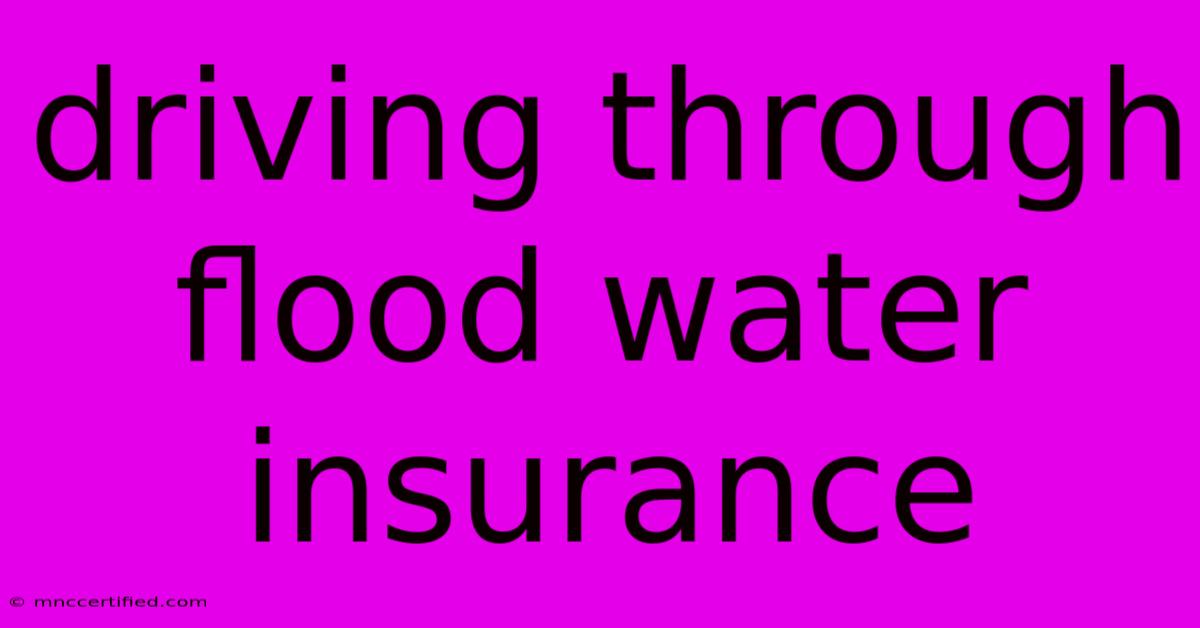Driving Through Flood Water Insurance

Table of Contents
Driving Through Flood Water: The Insurance Implications You Need To Know
Flooding is a natural disaster that can strike anywhere, anytime. The aftermath of a flood often involves damaged roads and infrastructure, making navigating through flooded areas a risky proposition. Driving through flood water can not only put your safety at risk but also lead to significant insurance complications. Here’s what you need to know about driving through flood water and its impact on your insurance coverage.
The Dangers of Driving Through Flood Water
Before we dive into the insurance implications, let's understand the serious risks associated with driving through flood water:
- Vehicle Damage: Flood water can cause severe damage to your vehicle's engine, transmission, electrical system, and even the body. The water can seep into vital components, causing corrosion and short circuits, leading to costly repairs.
- Loss of Control: Flood water reduces traction, making it extremely difficult to control your vehicle. The road surface can become slippery, and you may lose visibility due to the water's depth. This increases the risk of accidents.
- Health Risks: Flood water can contain harmful bacteria, viruses, and pollutants that can cause illness or infections. It's crucial to take precautions to avoid contact with contaminated water.
Insurance Coverage for Flood Damage
Standard Auto Insurance: Most standard car insurance policies do not cover flood damage. This means if your car is damaged by flood water, you will likely be responsible for the repair or replacement costs.
Flood Insurance: To protect yourself from flood damage, you need to purchase separate flood insurance. This coverage is typically offered through the National Flood Insurance Program (NFIP) or private insurance companies.
Important Considerations:
- Flood Zones: Flood insurance is typically required if you live in a designated flood zone. However, it's essential to understand that even areas outside of designated zones can experience flooding.
- Coverage Limits: Flood insurance has coverage limits, which are usually determined by the value of your vehicle and the level of flood risk in your area.
- Waiting Periods: There may be a waiting period before flood insurance coverage becomes effective, so it's crucial to purchase coverage well in advance of potential floods.
What to Do After Driving Through Flood Water
If you've driven through flood water, it's important to take the following steps:
- Assess Damage: Carefully inspect your vehicle for any signs of damage, including water in the engine compartment, electrical problems, or damage to the body.
- Contact Your Insurance Company: Report the incident to your insurance company, even if you don't think there is damage. This will help document the event and may be necessary for future claims.
- Professional Inspection: Schedule a professional inspection by a mechanic to assess the extent of the damage.
- Document Everything: Keep records of all communication with your insurance company, repair receipts, and photographs of any damage.
Key Takeaways
- Driving through flood water is extremely dangerous and can result in significant damage to your vehicle.
- Standard auto insurance typically does not cover flood damage.
- You need to purchase separate flood insurance to protect yourself from financial losses.
- If you've driven through flood water, it's essential to assess damage, contact your insurance company, and seek professional inspection.
Remember, your safety should always be your top priority. If you encounter a flooded area, it's best to turn around and find an alternate route. It's always safer to be safe than sorry.

Thank you for visiting our website wich cover about Driving Through Flood Water Insurance. We hope the information provided has been useful to you. Feel free to contact us if you have any questions or need further assistance. See you next time and dont miss to bookmark.
Featured Posts
-
Livestream West Ham Vs Everton Premier League
Nov 10, 2024
-
U19 Womens T20 Qualifier Uae Thailand Victorious
Nov 10, 2024
-
Can You Sell Life Insurance Part Time
Nov 10, 2024
-
Weekly One Liners November 4 11 2024
Nov 10, 2024
-
Nets Vs Cavs Odds Picks And Predictions
Nov 10, 2024